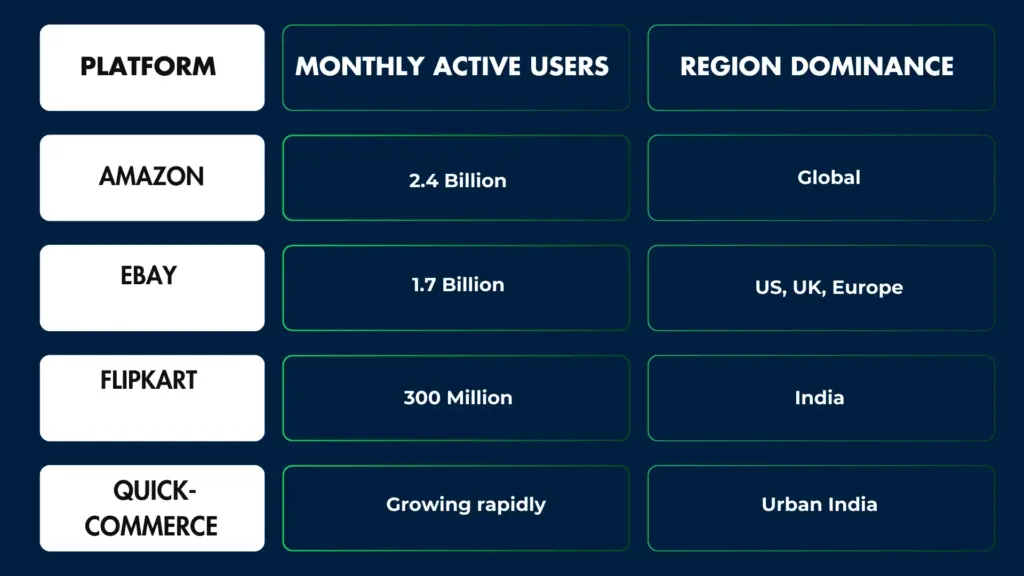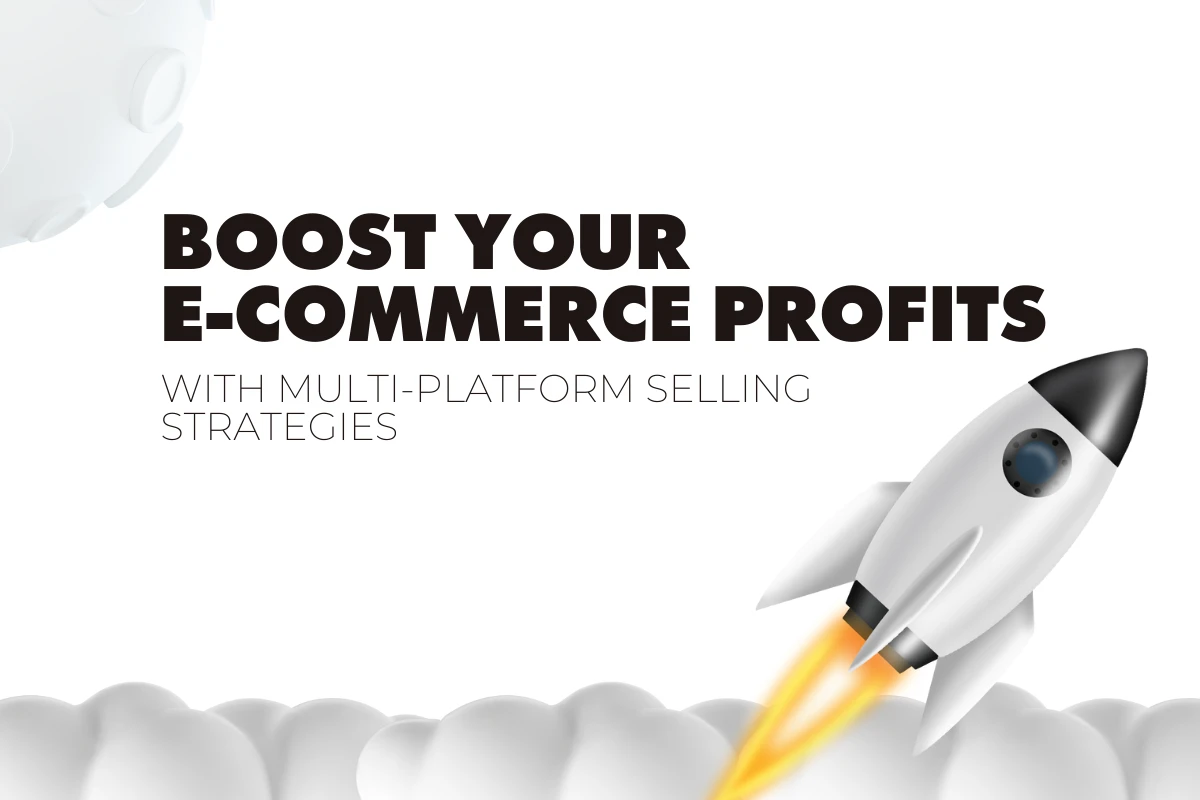Imagine you’ve launched a beautifully designed website for your business, yet your sales are trickling in slowly. You’ve invested in social media ads, optimized your homepage, and yet, something’s missing. The missing link? Multi-platform selling. In today’s competitive e-commerce world, relying on just one channel—say your own website—can severely limit your reach and profitability. Did you know that eBay and Amazon together hold over 50% of the global e-commerce market share? That’s a massive opportunity waiting to be tapped.
In this blog, we’ll explore how adopting multi-platform selling strategies can boost your e-commerce profits, increase brand visibility, and reduce dependency on a single revenue stream. You’ll learn the challenges businesses face when sticking to single-channel sales, discover actionable solutions to overcome them, and dive into real-life examples of brands that scaled their operations using platforms like eBay, Amazon, and Flipkart. Whether you’re a startup or a growing brand, these insights can reshape your growth trajectory.
1. The Challenge: Over-Reliance on Single-Channel Selling
E-commerce success today isn’t just about having a great product—it’s about being where your customers are. And your customers? They’re spread across eBay, Amazon, Flipkart, quick-commerce platforms like Blinkit and Zepto, and beyond. Businesses that rely solely on their website or one marketplace risk stagnation due to limited visibility.
A survey by Statista showed that 54% of online shoppers start their product search on Amazon, while 16% begin on eBay. Ignoring these platforms means missing out on millions of potential customers. Moreover, depending on a single platform makes businesses vulnerable to algorithm updates, policy changes, or sudden traffic drops.
Here’s a table illustrating the reach of major platforms:

Another issue businesses face is improper listings. Using amazon listing services or flipkart listing service becomes crucial to maintain consistency and appeal. Without professional help from an ecommerce marketing agency or amazon service provider network, many listings fail to meet SEO standards or brand expectations.
2. The Solution: Embrace Multi-Platform Selling with the Right Partners
To thrive in this environment, you need to diversify your online presence. Multi-platform selling involves listing your products across marketplaces like Amazon, eBay, Flipkart, and even partnering with quick-commerce marketing services for hyper-local reach. Here’s how you can do it effectively:
a. Choose the Right Platforms
- eBay: Ideal for refurbished, second-hand, or niche products.
- Amazon: Great for new, high-volume, or global SKUs.
- Flipkart: Especially useful for penetrating Indian Tier 2 and Tier 3 cities.
- Quick-commerce platforms: Best for daily-need and consumable products.
b. Use Specialized Listing Services
Partner with experts offering:
- amazon product listing services to optimize SEO and keyword density.
- flipkart service provider support to ensure compliance with policies.
- Multi-platform catalog synchronization via ecommerce marketplace marketing company.
c. Invest in Performance Marketing
A well-structured ad campaign is crucial to stand out on crowded platforms. Collaborate with:
- An amazon ad agency or amazon advertising agency for ACoS-optimized campaigns.
- A quick-commerce marketing agency to tap into impulsive purchase behavior.
- An experienced ecommerce marketing company to manage campaigns across marketplaces.
d. Streamline Account Management
From order tracking to performance analysis, managing multiple platforms can be tedious. Rely on:
- amazon account management services to keep your brand competitive.
- An ecommerce marketplace marketing agency to integrate and automate operations.
- A trusted ecommerce agency near me for personalized, hands-on support.
3. Real-Life Success Stories and Strategic Execution
Let’s look at how some brands aced their e-commerce growth with multi-platform strategies:
Case Study 1: Local Brand to National Icon with Amazon & Flipkart
A Maharashtra-based dairy brand started listing their ghee and flavored milk products only on their website. Realizing the limited reach, they onboarded an amazon marketing agency and added amazon product listing services. Within 6 months, revenue doubled. Then, they expanded to Flipkart using a flipkart service provider, targeting smaller cities. Their next move? Launching on Zepto using a quick-commerce services marketing company. This allowed them to compete with national brands in metros, boosting monthly sales by 40%.
Case Study 2: Niche Craft Seller on eBay & Amazon
A small handicrafts business, originally dependent on Instagram, partnered with an ecommerce marketplace marketing company to explore eBay and Amazon. With help from an amazon marketing services provider and amazon account management services, they scaled from 100 orders/month to over 1,000 in under a year. Their listings were enriched using amazon listing services, while targeted PPC campaigns via an amazon advertising agency helped lower ACoS and boost ROI.
Conclusion
Multi-platform selling is no longer a luxury—it’s a necessity in today’s hyper-competitive e-commerce landscape. Relying solely on your website or a single marketplace limits your exposure and makes you vulnerable to unpredictable market shifts. Platforms like eBay, Amazon, Flipkart, and quick-commerce apps have opened up immense opportunities to reach segmented audiences and scale revenue exponentially.
By leveraging the expertise of an amazon marketing company, utilizing ecommerce marketing services, and onboarding with a quick-commerce marketing agency, businesses can diversify risk, improve brand visibility, and drive consistent growth. Don’t forget the value of proper listings, account management, and platform-specific ad strategies—without them, you’re only scratching the surface of your potential.
Ready to take your brand across the marketplace universe? Partner with AKOI, your trusted ecommerce marketplace marketing agency, for end-to-end support—from listing optimization to targeted ad campaigns and account management. Let’s skyrocket your e-commerce journey together. Get in touch today!


